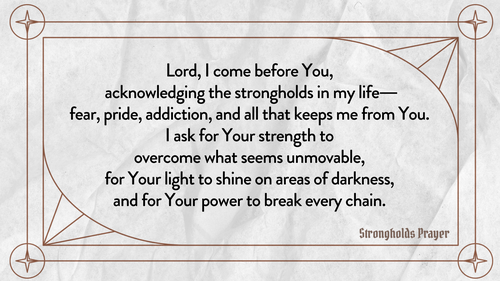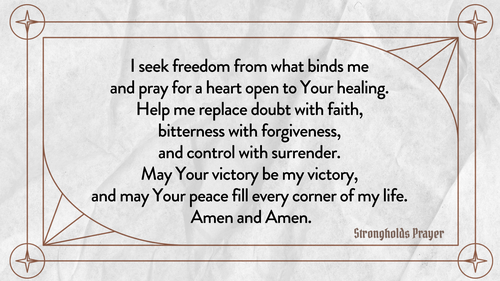Strongholds
In Joshua 10:16-25, we witness a powerful story of battle, faith, and victory. Joshua and the Israelite army, aligned with God, confront the five kings of the Amorites, symbolizing spiritual strongholds. This passage unfolds with profound lessons about overcoming life’s most stubborn and harmful barriers through faith and divine partnership.
The narrative begins with five kings hiding in a cave at Makkedah. Joshua, upon hearing of their location, orders the cave to be sealed with rocks and guarded (Joshua 10:17-18). While the rest of the army continues their pursuit, Joshua’s focus is clear: no stronghold is to be left unchecked. The five kings represent spiritual strongholds that must be overcome before fully entering the promises of God.
For us today, these strongholds often manifest as harmful thought patterns, deeply rooted sins, negative self-talk, fears, or habits that resist God’s will. They isolate, distort our identity, and paralyze spiritual growth. Recognizing these spiritual strongholds is the first step to overcoming them.
Imagine being told repeatedly that every bridge you encounter is unreliable, even though they’ve proven themselves time and time again. Over time, skepticism seeps in, causing doubt and fear. Similarly, our culture often views prayer with skepticism, dismissing it as ineffective or outdated. Without reinforcement and consistent practice, Christians may grow hesitant and discouraged about prayer’s authenticity and power, making it easier for spiritual strongholds to persist.
In the story, Joshua eventually orders the rocks to be removed, bringing the five kings out for all to see (Joshua 10:22-23). The act of placing their feet on the necks of these kings was a powerful symbol. In ancient times, it symbolized victory over one’s enemies, yet Joshua’s humility shows that it was God who enabled their success. He reminds his people: “Be strong and courageous, for the Lord is going to do this to all of your enemies” (Joshua 10:25).
Joshua’s actions teach us two important spiritual truths:
To break free, we must take intentional action:
When we engage in the battle against spiritual strongholds, we must remember: success belongs to God. We are not called to fight in our strength but to rely on His. Like Joshua, we should act as faithful partners, trusting God to bring victory.
Our battles may not involve physical enemies, but spiritual strongholds are real. God calls us to fight as citizens of heaven, wielding spiritual weapons like prayer, so that He can work in us with grace and love. When we align with Him, He forges healthy strongholds that protect our hearts, thoughts, families, and church.
May we, like Joshua, stand not still but move in faith, trusting God to do what only He can do—defeat every stronghold that keeps us from the fullness of life He promises.
The narrative begins with five kings hiding in a cave at Makkedah. Joshua, upon hearing of their location, orders the cave to be sealed with rocks and guarded (Joshua 10:17-18). While the rest of the army continues their pursuit, Joshua’s focus is clear: no stronghold is to be left unchecked. The five kings represent spiritual strongholds that must be overcome before fully entering the promises of God.
For us today, these strongholds often manifest as harmful thought patterns, deeply rooted sins, negative self-talk, fears, or habits that resist God’s will. They isolate, distort our identity, and paralyze spiritual growth. Recognizing these spiritual strongholds is the first step to overcoming them.
Imagine being told repeatedly that every bridge you encounter is unreliable, even though they’ve proven themselves time and time again. Over time, skepticism seeps in, causing doubt and fear. Similarly, our culture often views prayer with skepticism, dismissing it as ineffective or outdated. Without reinforcement and consistent practice, Christians may grow hesitant and discouraged about prayer’s authenticity and power, making it easier for spiritual strongholds to persist.
In the story, Joshua eventually orders the rocks to be removed, bringing the five kings out for all to see (Joshua 10:22-23). The act of placing their feet on the necks of these kings was a powerful symbol. In ancient times, it symbolized victory over one’s enemies, yet Joshua’s humility shows that it was God who enabled their success. He reminds his people: “Be strong and courageous, for the Lord is going to do this to all of your enemies” (Joshua 10:25).
Joshua’s actions teach us two important spiritual truths:
- It is not our job to defeat the enemy or destroy the stronghold on our own. Our role is to align ourselves with God through prayer.
- God desires to partner with us in prayer, unleashing divine power to bring victory over harmful strongholds, forge resilient faith, and equip us for future spiritual battles.
To break free, we must take intentional action:
- Pray consistently and intentionally. Prayer connects us to God’s power and breaks spiritual chains.
- Worship and immerse yourself in Scripture. God’s Word reinforces truth and dismantles lies.
- Seek accountability and support. Trusted community members can walk alongside you, offering encouragement.
- Ask God to identify your strongholds. Bring them before Him in prayer, just as Joshua brought out the kings.
When we engage in the battle against spiritual strongholds, we must remember: success belongs to God. We are not called to fight in our strength but to rely on His. Like Joshua, we should act as faithful partners, trusting God to bring victory.
Our battles may not involve physical enemies, but spiritual strongholds are real. God calls us to fight as citizens of heaven, wielding spiritual weapons like prayer, so that He can work in us with grace and love. When we align with Him, He forges healthy strongholds that protect our hearts, thoughts, families, and church.
May we, like Joshua, stand not still but move in faith, trusting God to do what only He can do—defeat every stronghold that keeps us from the fullness of life He promises.


Posted in Sermon Outline
Recent
The Quiet Power of Humility
February 16th, 2026
The Good Life Isn't Bought, It's Built
February 9th, 2026
When Storms Become Doorways: Finding Hope Beyond the Rainbow
February 2nd, 2026
When Love Refuses to End the Story Too Soon
January 19th, 2026
How to Find Alignment in a Fast-Paced World
January 12th, 2026
